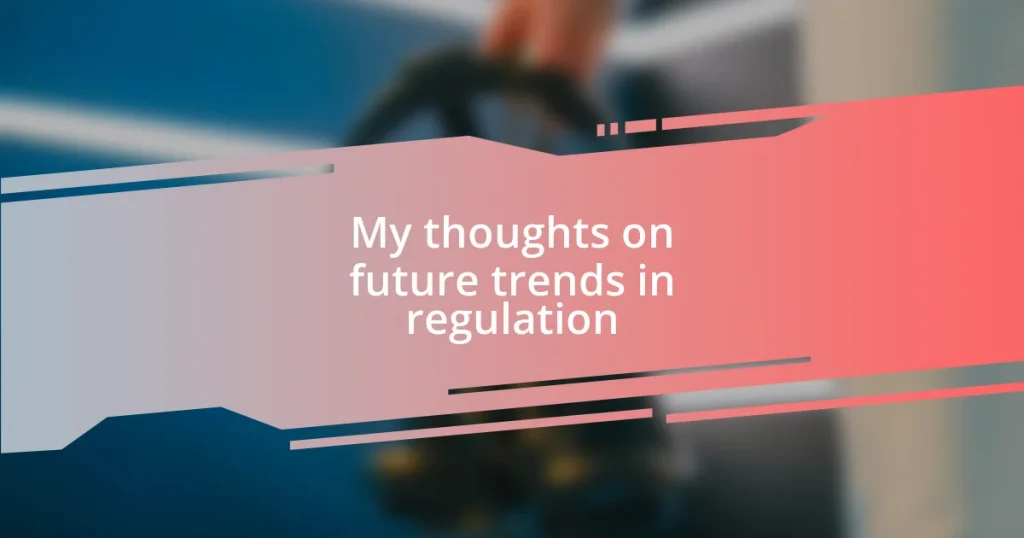Key takeaways:
- Regulatory trends are evolving with an increased focus on sustainability and the impact of digital technologies, prompting a need for adaptive frameworks.
- Globalization significantly influences regulatory practices, creating a demand for harmonized regulations and collaborative approaches to shared challenges.
- Consumer protection and data privacy are paramount, with growing calls for transparency and more robust laws to safeguard individual rights in an increasingly digital world.
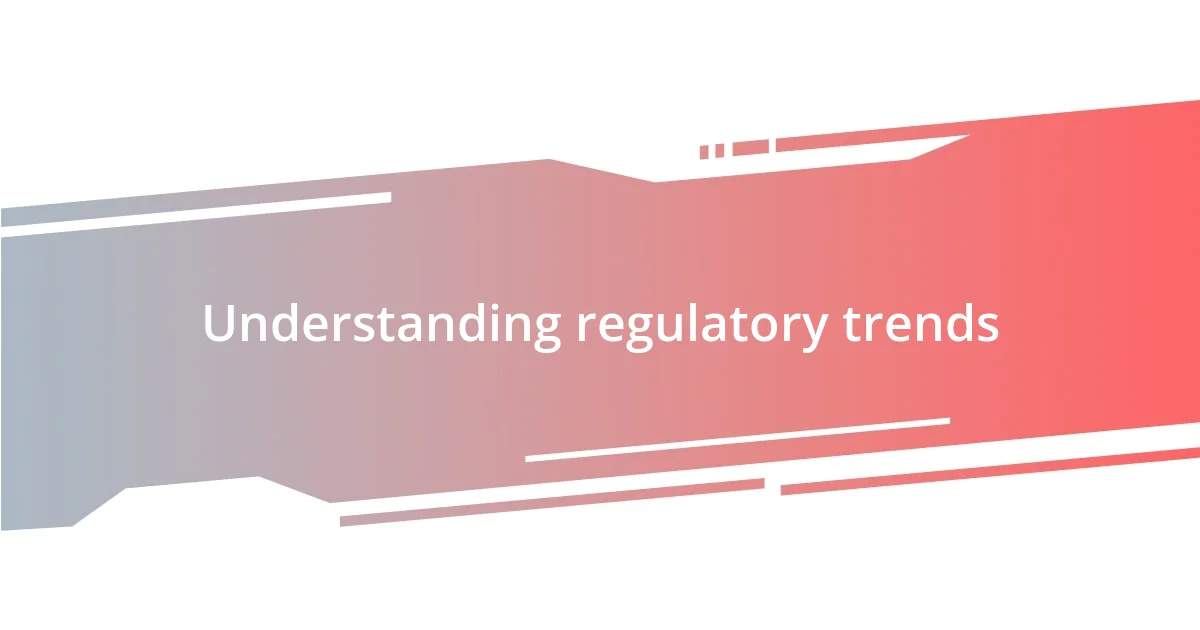
Understanding regulatory trends
Regulatory trends are constantly evolving, reflecting the changing societal values and technological advancements. I remember when the General Data Protection Regulation (GDPR) was introduced; it sparked intense conversations about privacy and consumer rights. It made me wonder: How much personal information are we truly willing to sacrifice in exchange for convenience?
One notable trend is the growing emphasis on sustainability in regulation. I’ve seen businesses shift their practices as regulatory bodies push for greener initiatives. It’s fascinating to me how regulations can drive innovation—companies are not just complying, but actively seeking to lead in sustainable practices. Isn’t it amazing how mandates can turn into meaningful change?
Moreover, the rise of digital technologies, like blockchain and artificial intelligence, has prompted regulators to reconsider existing frameworks. I often reflect on how these technologies challenge traditional compliance measures. How do we regulate something as dynamic as AI without stifling its potential? It’s a delicate balance that requires ongoing dialogue between regulators, businesses, and the public.
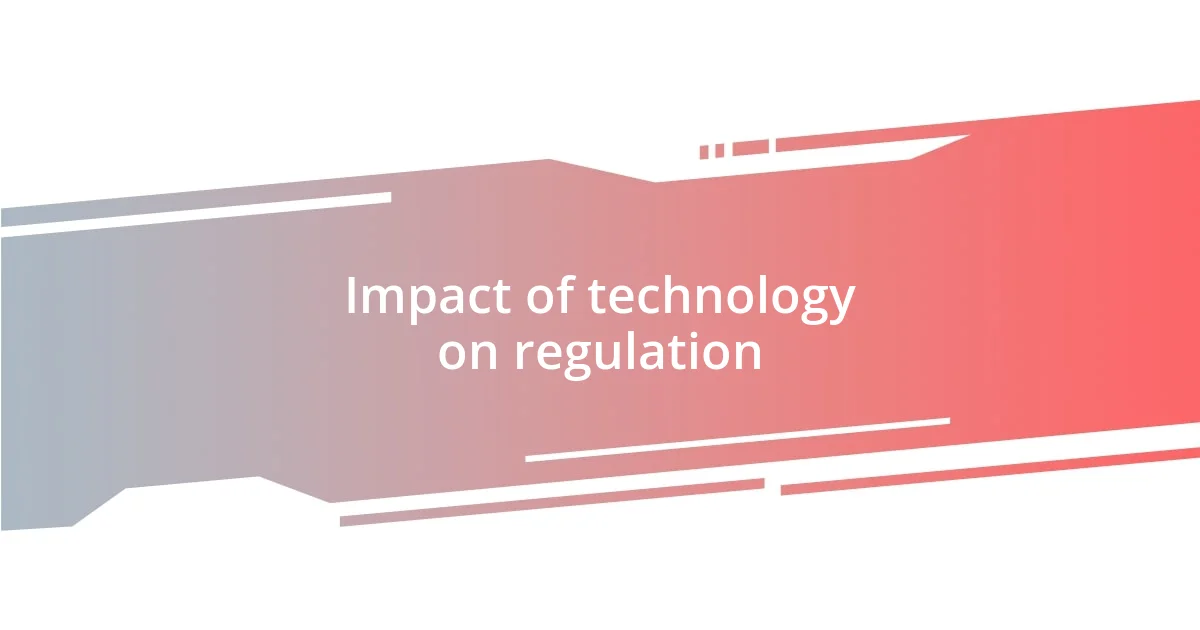
Impact of technology on regulation
The integration of technology in regulation cannot be overstated. I recall attending a panel discussion where experts debated the implications of big data on compliance. It struck me how organizations are now leveraging advanced analytics to not only adhere to regulations but to predict compliance risks before they become issues. This proactive approach fascinates me—transforming what used to be a reactive process into a forward-thinking strategy.
As technology continues to evolve, regulations must keep pace. I’ve seen how fintech companies adapt to new regulations emerging around digital currencies. The rapid pace of innovation often leaves regulators playing catch-up. I can’t help but feel that this race can lead to unintended consequences—like innovative solutions being stifled simply because the regulations haven’t quite figured out how to fit them in.
Furthermore, technology has broadened the landscape of accountability. In my own experience, witnessing organizations adopt automated compliance tools has been remarkable. These tools enhance transparency and accuracy, fostering a culture of compliance that I believe is essential for the future. It’s invigorating to think about how technology can empower both regulators and businesses in creating a more accountable environment.
| Aspect | Impact of Technology |
|---|---|
| Compliance Approach | Proactive prediction of risks |
| Regulatory Adaptation | Racing to keep up with innovation |
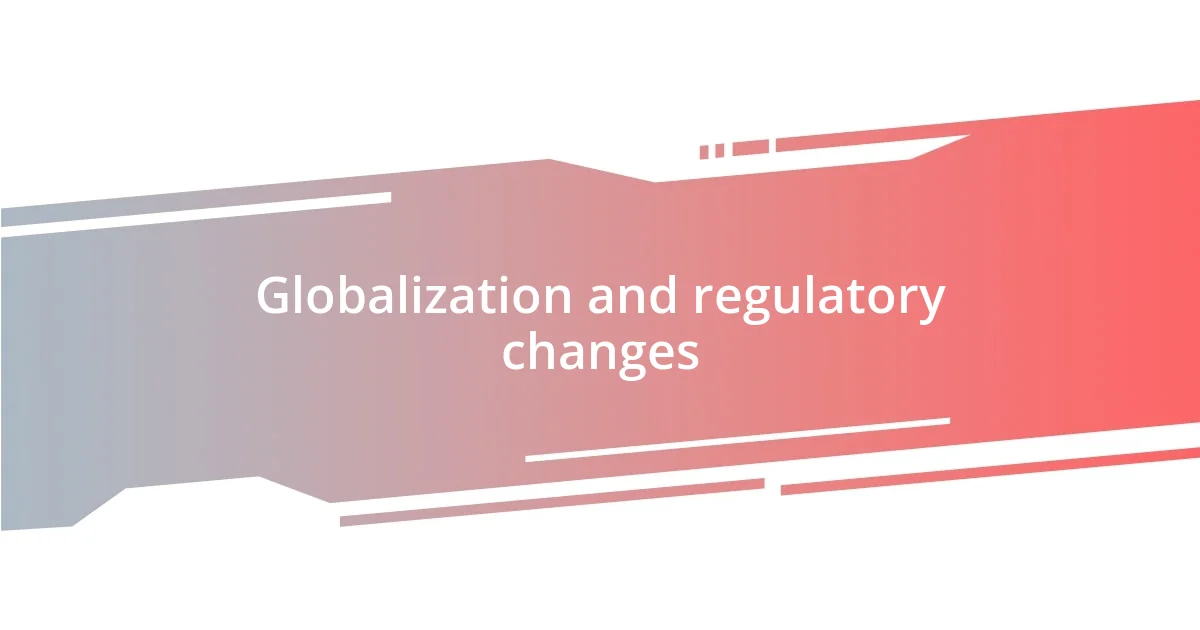
Globalization and regulatory changes
Globalization has reshaped how regulations are crafted and implemented across borders. I’ve noticed that the interconnectedness of economies means that regulatory changes in one country can ripple across the globe. For instance, when the European Union strengthened its data protection laws, many companies worldwide scrambled to comply. It’s intriguing how a regulatory shift in one region can set a precedent, influencing regulations elsewhere.
- The increasing mobility of businesses and consumers creates a demand for harmonized regulations.
- Cross-border collaborations are becoming essential to address shared challenges, like environmental sustainability.
- Regulators must navigate diverse legal cultures and values, necessitating a delicate balancing act.
- Digital platforms have blurred the lines of jurisdiction, complicating enforcement and compliance.
Reflecting on my experiences, I often think about how globalization leads to innovative regulatory frameworks. This evolution can be exhilarating, as it fosters collaboration among nations to tackle issues like climate change or consumer rights. I find it compelling how these interconnected regulations can create a shared responsibility among nations, ultimately driving progress.
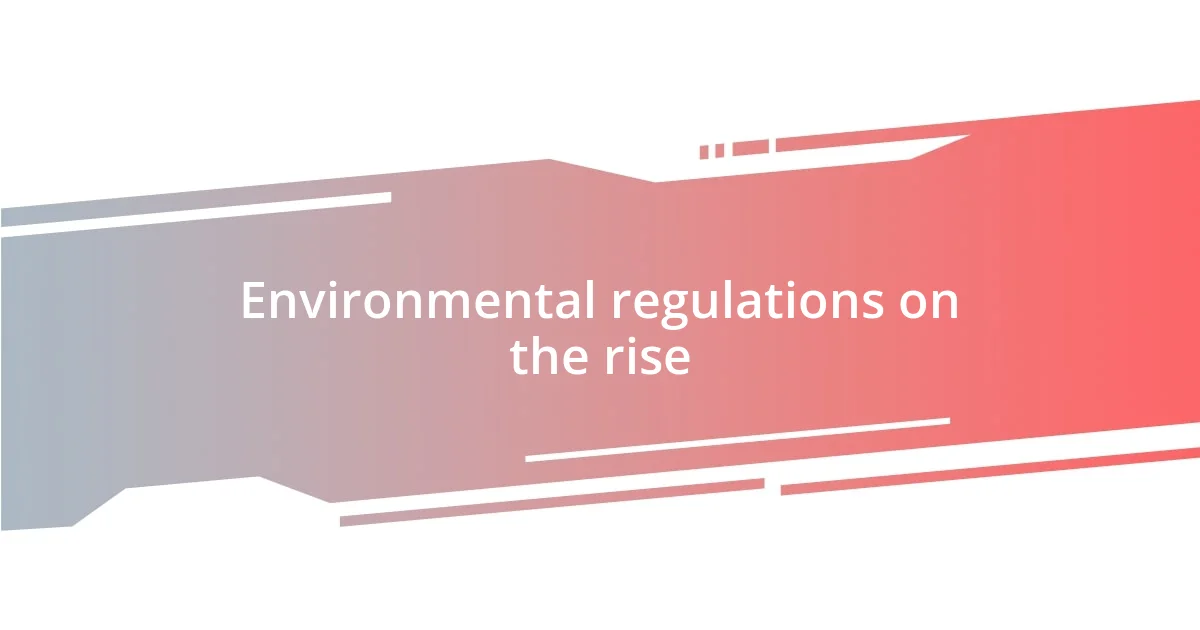
Environmental regulations on the rise
The push for stronger environmental regulations is becoming impossible to ignore. I remember a conversation with a friend who works in corporate sustainability; he passionately described how his company is preparing for stricter environmental laws. It’s inspiring to see organizations align their strategies with a greener future, reflecting a growing acknowledgment that sustainability is not just a trend but an ethical necessity.
There’s a sense of urgency in the air, as communities worldwide advocate for more drastic measures against climate change. I recall attending a town hall where residents rallied for improved regulations on local waste management. The collective energy was electrifying, underscoring how grassroots movements can pressure lawmakers into action. It brings to mind the question: How can we, as citizens, continue to support this wave of change? Personally, I believe every voice matters, and small actions can lead to significant shifts.
Looking at recent developments, I see a notable increase in global commitments to environmental standards. I recently read about a multinational corporation committing to net-zero emissions by 2050. It made me reflect on how businesses are now recognizing their role in a larger ecological narrative. This transformation excites me; it feels like a pivotal moment where regulations could very well align with genuine corporate responsibility, creating a harmonious relationship between profit and planet.
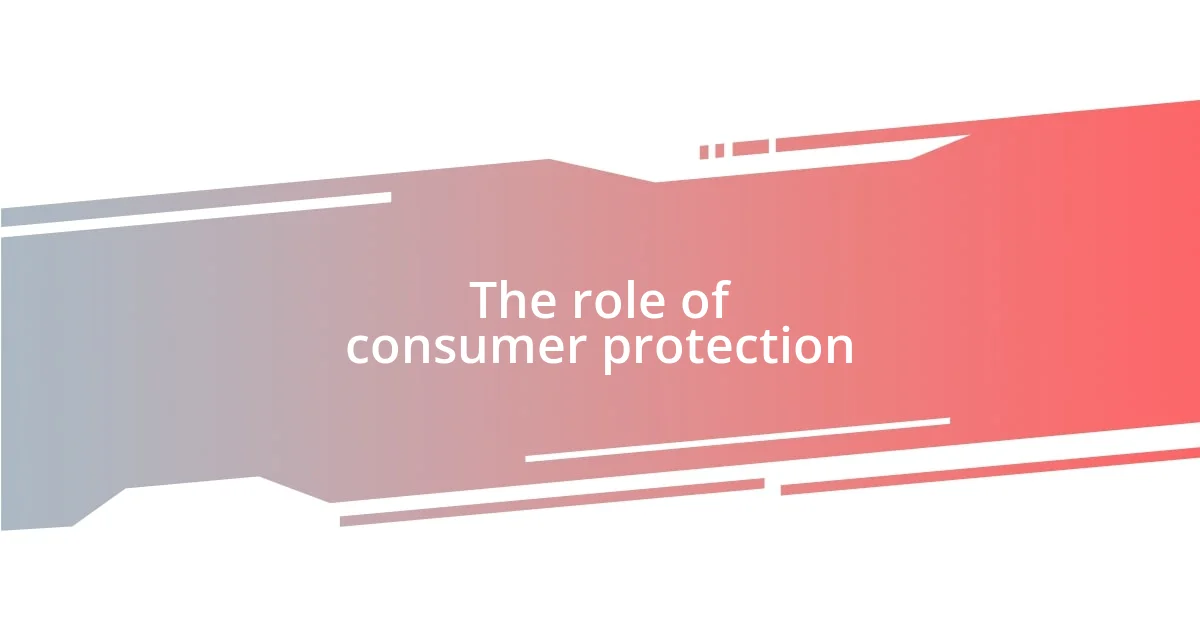
The role of consumer protection
Consumer protection plays a critical role in ensuring that individuals are shielded from unfair practices and unsafe products in today’s rapidly evolving market. I distinctly remember an experience I had when I purchased an electronic gadget online, only to find out it didn’t meet the promised safety standards. This incident highlighted how essential consumer protection regulations are for maintaining trust between consumers and businesses. Without proper safeguards in place, people can feel vulnerable and deceived.
As I reflect on my time working with various stakeholders, I’ve come to appreciate how consumer protection laws not only empower individuals but also foster a healthier marketplace. When consumers have confidence that their rights are upheld, they are more likely to engage in purchasing decisions, ultimately spurring economic growth. Isn’t it fascinating how a system designed to protect individuals can also drive prosperity for businesses?
Moreover, the digital landscape has transformed the consumer experience, bringing new challenges in protecting personal data and privacy. I recall attending a workshop where attendees shared their concerns about online scams. Conversations like those reveal how crucial it is for regulators to stay ahead of trends, ensuring consumer protection measures evolve alongside technology. In this increasingly complex environment, proactive regulations are essential to create a safe space where consumers can navigate effortlessly and confidently.
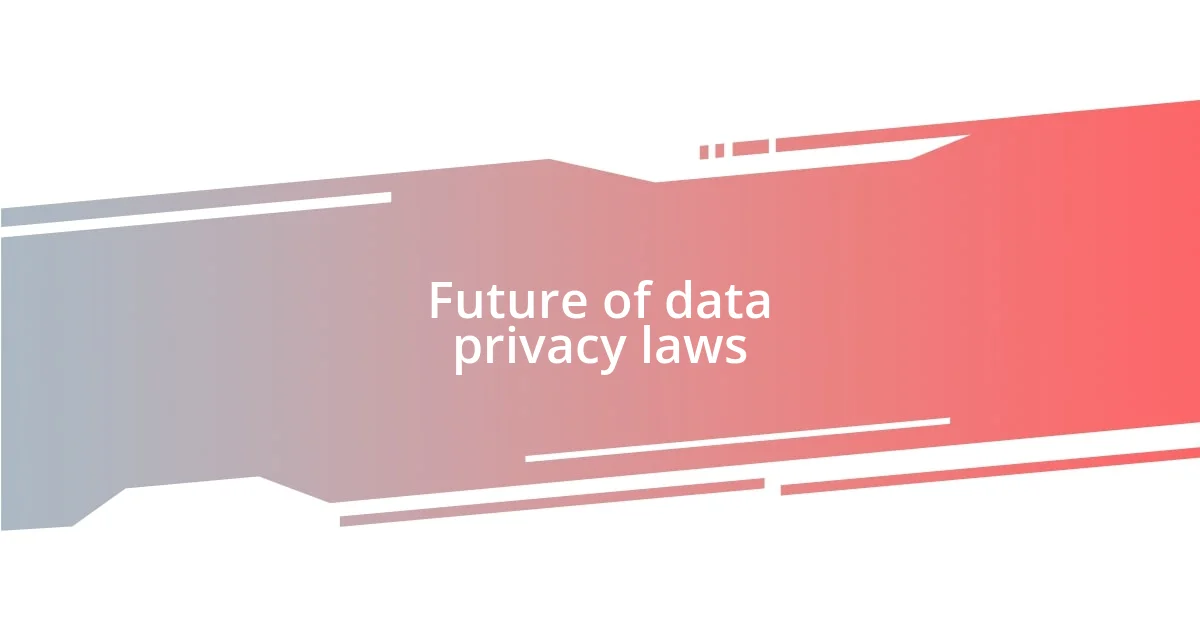
Future of data privacy laws
As I look towards the future of data privacy laws, I can’t help but feel a mix of hope and anxiety. The digital landscape is reshaping how we think about privacy, and I remember a startling moment when I discovered my personal information had been leaked in a data breach. It left me questioning how effectively current regulations protect our rights. Isn’t it alarming to think about how much of our personal lives we freely exchange online, often without fully understanding the implications?
One thing that stands out to me is the increasing demand for transparency from companies about how they handle our data. I once had a conversation with a tech-savvy friend who shared how relieved she felt when a popular app updated its privacy policy to clarify data usage. This wave of transparency not only builds consumer trust but also raises the bar for businesses to prioritize ethical data practices. I wonder, how can we encourage more companies to adopt a culture of openness regarding our data?
Looking ahead, I sense that data privacy regulations will evolve to be more robust and user-centric. I’ve read about countries considering laws that give users greater control over their information, like the right to delete or access their data with ease. Imagine a world where every individual feels empowered in their digital interactions—wouldn’t that reshape our relationship with technology? It’s inspiring to think that as these laws strengthen, they could foster a safer online environment where trust reigns supreme.
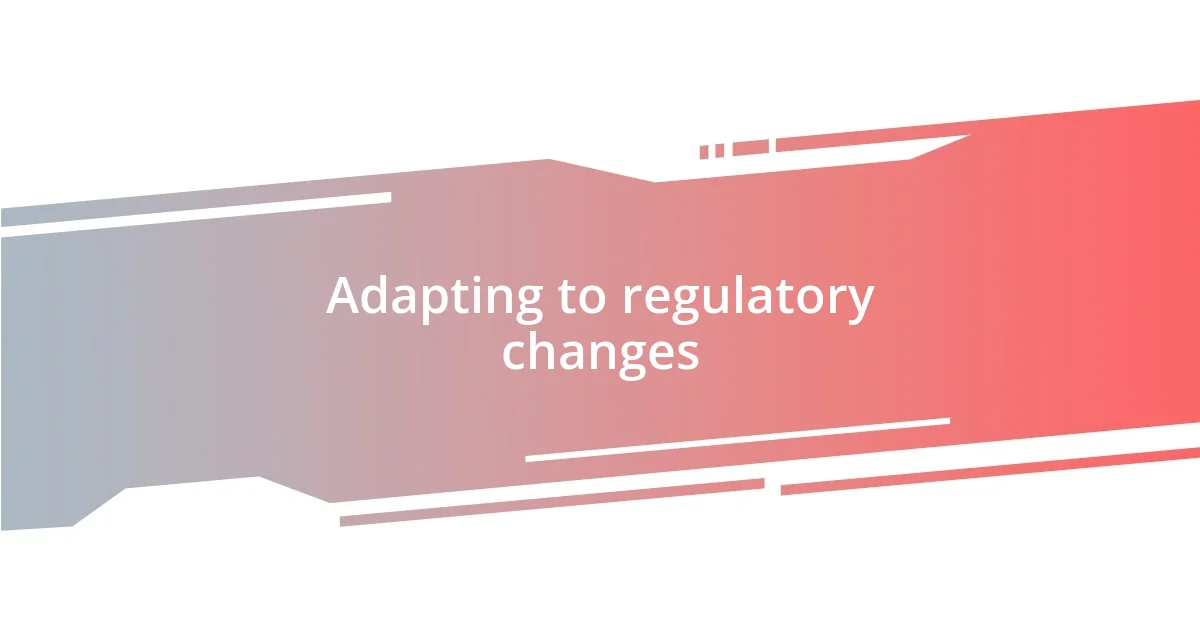
Adapting to regulatory changes
Adapting to regulatory changes is a dynamic process that requires both vigilance and flexibility. I remember when a major update in financial regulations affected my investment portfolio. Initially, it felt overwhelming, but I learned to embrace change by proactively seeking out resources, expert opinions, and community discussions. It was a challenge, but navigating those regulations opened the door to new opportunities I wouldn’t have considered otherwise. How often do we find ourselves hesitating, only to discover that adaptation can lead to growth?
One aspect that intrigues me is how organizations can foster a culture of adaptability. In my experience, teams that prioritize continuous learning can respond more effectively to regulatory changes. During a workshop on compliance, I noticed a marked shift in my colleagues’ attitudes once we framed the new regulations as an opportunity rather than a burden. Having a positive approach can turn a daunting task into a collaborative journey. Can you recall a time when embracing change brought unexpected benefits?
It’s crucial to remember that adaptation doesn’t happen in isolation; it requires collaboration among various stakeholders. I’ve seen firsthand how companies—especially in tech—benefit from working closely with regulators and industry experts. A colleague once shared how engaging with regulatory bodies helped her company shape compliance measures that not only met legal standards but also enhanced customer satisfaction. By viewing regulatory changes as a partnership, organizations can steer toward innovation and sustainability together. Isn’t it empowering to think about how we can actively shape the future of regulation through collaboration?










